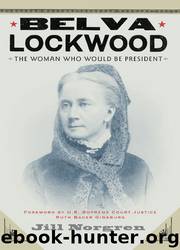Belva Lockwood by Norgren Jill;

Author:Norgren, Jill;
Language: eng
Format: epub
Publisher: NYU Press
Published: 2007-09-14T04:00:00+00:00
12
Lay Down Your Arms!
War must be stripped of its gaudy attire, its so-called greatness and glory.
Universal Peace Union, 1886
Lockwood’s scrappy defense of the Mormons stood in marked contrast to her quiet and dignified work on behalf of world peace. She had joined the Universal Peace Union (UPU) in 1868. It was the most radical peace organization in the United States. Her commitment to the society came without any particular soul searching; rather, she carried within her the optimism of the pre-Civil War period, the evangelical Protestant “fire of the spirit” that had fueled America’s earlier enthusiasm for personal and societal salvation. She believed in perfection on earth, and after attending a UPU gathering at the Union League Hall in 1868 had concluded that the group’s principles were “in consonance with my own.”1 Those principles combined a belief in living the Christian gospel of love and nonviolence while promoting the prevention of war through concrete policies, including public education, disarmament, and arbitration.2 This struck her as a blueprint by which a more just and peaceful world might be built, a praiseworthy Christian world.
Lockwood had not opposed the Civil War. After joining the Universal Peace Union she argued that there were alternatives that might have been used to end slavery, such as paying slaveholders to free the people they held in bondage, but during the war she had supported Lincoln and the Union cause, and had organized local women in New York to provision soldiers. Perhaps as Ezekiel’s bride, listening to his first-hand accounts of Bull Run and Antietam, she had become more sensitive to the horrors of war. Her second husband had been much affected by his experience as a battlefield chaplain, having accompanied his regiment in the field for two years.3
The Universal Peace Union, started in 1867, was a small society intellectually and spiritually connected to the extreme views of an earlier generation of pacifists, particularly William Lloyd Garrison. In 1838 the fiery and controversial Garrison had helped to form the New England Non-Resistance Society (NENRS) after a split with the American Peace Society (APS) over the acceptability of defensive war. Garrison envisioned a radically different society—one that would not discriminate because of sex or race, one governed by the Sermon on the Mount (Matt. 5:38–39).4 Preaching Christian perfectionism, the belief that humans could achieve sanctification, he argued that men and women must renounce all forms of violence. The NENRS Declaration of Sentiments, authored by Garrison, challenged people not only to disavow force in the most personal aspects of their lives but also, because of the inherent violence of the state, to refuse to serve in the military, vote in public elections, or hold public office. Garrison’s revolutionary nonresistance posed a severe test of temperament and action, and attracted few acolytes. The NENRS remained small and marginal within the peace movement although Garrison anticipated Thoreau, Gandhi, and Martin Luther King, Jr.
At the end of the Civil War a number of men and women well known in American communities of conscience came forward, resolved to establish a new peace organization.
Download
This site does not store any files on its server. We only index and link to content provided by other sites. Please contact the content providers to delete copyright contents if any and email us, we'll remove relevant links or contents immediately.
| Civilization & Culture | Expeditions & Discoveries |
| Jewish | Maritime History & Piracy |
| Religious | Slavery & Emancipation |
| Women in History |
Cecilia; Or, Memoirs of an Heiress — Volume 1 by Fanny Burney(32558)
Cecilia; Or, Memoirs of an Heiress — Volume 2 by Fanny Burney(31956)
Cecilia; Or, Memoirs of an Heiress — Volume 3 by Fanny Burney(31942)
The Secret History by Donna Tartt(19092)
Sapiens: A Brief History of Humankind by Yuval Noah Harari(14389)
Leonardo da Vinci by Walter Isaacson(13337)
The Radium Girls by Kate Moore(12029)
Sapiens by Yuval Noah Harari(5372)
How Democracies Die by Steven Levitsky & Daniel Ziblatt(5219)
The Wind in My Hair by Masih Alinejad(5095)
Homo Deus: A Brief History of Tomorrow by Yuval Noah Harari(4918)
Endurance: Shackleton's Incredible Voyage by Alfred Lansing(4783)
Man's Search for Meaning by Viktor Frankl(4607)
The Silk Roads by Peter Frankopan(4534)
Millionaire: The Philanderer, Gambler, and Duelist Who Invented Modern Finance by Janet Gleeson(4478)
The Rape of Nanking by Iris Chang(4213)
Joan of Arc by Mary Gordon(4113)
The Motorcycle Diaries by Ernesto Che Guevara(4102)
Stalin by Stephen Kotkin(3969)
